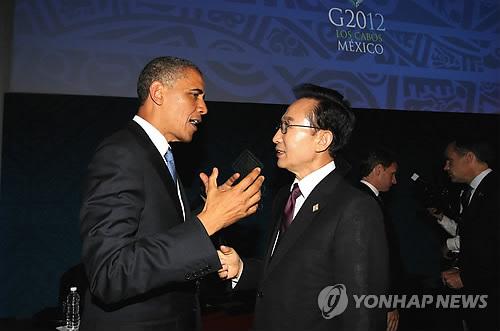Relations between the allies have been arguably at their best state in nearly a decade. Reflecting the closeness, Obama declared the bilateral alliance "the lynchpin" for security in the Pacific region in 2010, describing South Korea as the most significant U.S. partner in the region.
 |
At a 2009 summit, South Korean President Lee Myung-bak and Obama agreed to transform the alliance's purpose from primarily defending against a North Korean attack to a regional and even global alliance, in which they cooperate on issues such as climate change and terrorism. Lee and Obama have also forged close policy coordination over how to handle North Korea.
Much of the current bilateral intimacy is due to Lee, whose single five-year term ends in February of next year. By law, a South Korean president cannot seek re-election.
As South Korea's leadership is set to change hands in coming months, the current lockstep cooperation between the allies is unlikely to be sustainable, particularly for the North Korea policy, if a liberal candidate wins the Dec. 19 presidential election.
"In terms of future relations between Korea and the U.S., what's more important is who will take the presidential office in Korea, rather than a foreign-policy direction by the Obama second term," said Chun Chae-sung, a professor of international relations at Seoul National University.
"If an opposition candidate takes office and strengthens a policy of engagement with North Korea, it will have different priorities with the U.S. policy on the North and could cause some discord," Chun said.
Polls show that ruling party presidential candidate Park Geun-hye, daughter of former South Korean president Park Chung-hee, still leads in a three-way race with her two rivals -- main opposition candidate Moon Jae-In and independent software tycoon Ahn Cheol-soo. However, Park runs neck-and-neck in hypothetical two-way races with either Moon or Ahn.
This week, even conservative candidate Park said that, if elected, she will try to hold a summit with North Korean leader Kim Jong-un and propose exchanging economic liaison offices between the two divided countries.
Whoever wins in South Korea, Hong Hyun-ik, a researcher at the Sejong Institute think tank, expected the Obama second term to play a more active role in diplomacy with North Korea.
"Whoever wins in the December election, he or she will not be opposed to improving relations between the U.S. and North Korea," Hong said. "And as Obama has no burden for re-election, I think he will be more active on Korean Peninsula policy."
Obama has maintained the North Korean policy of "strategic patience," which essentially waits for the North to return to the negotiating table while keeping pressure on the regime to take steps toward denuclearization and to mend ties with South Korea.
Critics say the Obama administration's approach has allowed North Korea to control the situation and steadily improve its missile and nuclear programs.
Efforts to reopen the six-party talks, which were last held in late 2008, have been frozen since the North's April rocket launch, but analysts expect regional powers to resume diplomacy with North Korea sometime next year, after South Korea and China face leadership changes in the coming weeks, following this week's elections in the U.S.
The six-party talks aimed at diplomatically persuading the North to give up its nuclear ambitions include the two Koreas, the U.S., China, Russia and Japan.
Beyond 2013, the challenge before South Korea and the U.S. is how to maintain close cooperation while setting a new vision with the rise of China and the daunting task of navigating a course toward the resolution of the North's nuclear issue.
In a June speech at the Los Angeles World Affairs Council, South Korean Foreign Minister Kim Sung-hwan proposed a "value-based alliance" with the U.S. in coming years, urging the two nations to develop an alliance "always attentive to the changing global situation, always prepared to address our challenges and always proactive in creating a new order."
"Certainly, committing to a more comprehensive alliance demands more attention, more resources, more difficult decisions," Kim said. "But such is the price of progress, and it is a price we are willing to pay."
"A value-based alliance has its critics, yes. But I have no doubt that an alliance built on shared values will far outlast an alliance based only on the cold calculation of national interest," Kim said.
kdh@yna.co.kr
Source: english.yonhapnews.co.kr
oldmarine
'Yonhap' 카테고리의 다른 글
| <北로켓발사> 美에서 대북 강경론 제기 (0) | 2012.12.17 |
|---|---|
| Conservative activists denounce N. Korea's rocket launch (0) | 2012.12.14 |
| Member states of the U.N. Security Council (0) | 2012.10.19 |
| 김외교 "안보리진출로 대북억지력 상당부분 확보"(종합) (0) | 2012.10.19 |
| 軍, '노크귀순' 장성 5명ㆍ영관급 9명 문책 (0) | 2012.10.17 |